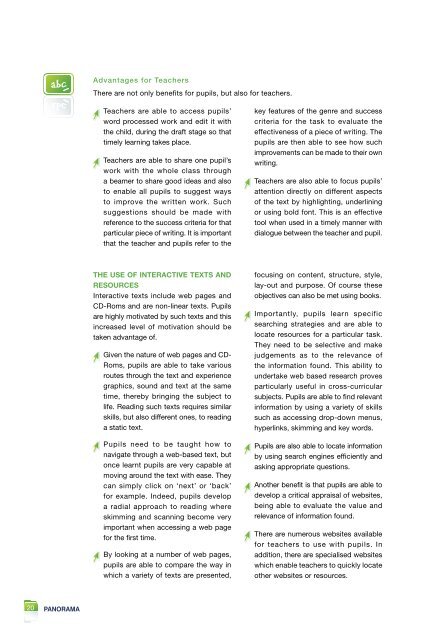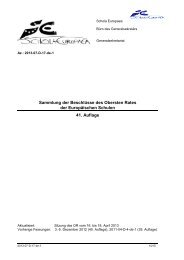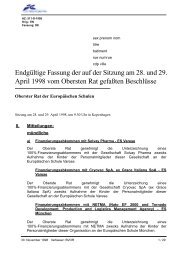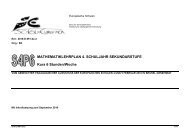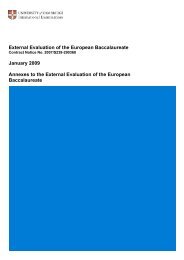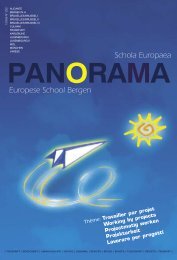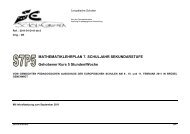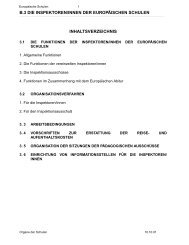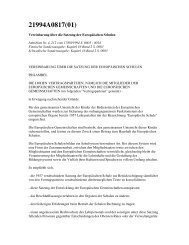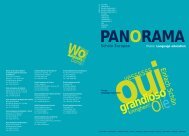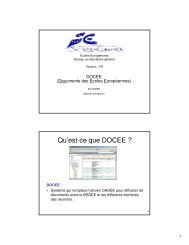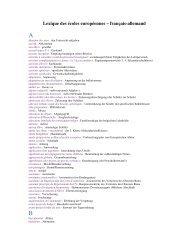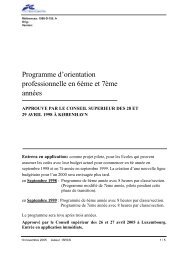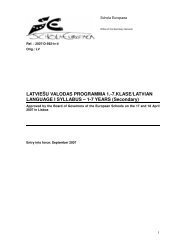Schola Europaea European School Brussels II
Schola Europaea European School Brussels II
Schola Europaea European School Brussels II
You also want an ePaper? Increase the reach of your titles
YUMPU automatically turns print PDFs into web optimized ePapers that Google loves.
20<br />
abc<br />
PANORAMA<br />
Advantages for Teachers<br />
There are not only benefits for pupils, but also for teachers.<br />
Teachers are able to access pupils’<br />
word processed work and edit it with<br />
the child, during the draft stage so that<br />
timely learning takes place.<br />
Teachers are able to share one pupil’s<br />
work with the whole class through<br />
a beamer to share good ideas and also<br />
to enable all pupils to suggest ways<br />
to improve the written work. Such<br />
suggestions should be made with<br />
reference to the success criteria for that<br />
particular piece of writing. It is important<br />
that the teacher and pupils refer to the<br />
THE USE OF INTERACTIVE TEXTS AND<br />
RESOURCES<br />
Interactive texts include web pages and<br />
CD-Roms and are non-linear texts. Pupils<br />
are highly motivated by such texts and this<br />
increased level of motivation should be<br />
taken advantage of.<br />
Given the nature of web pages and CD-<br />
Roms, pupils are able to take various<br />
routes through the text and experience<br />
graphics, sound and text at the same<br />
time, thereby bringing the subject to<br />
life. Reading such texts requires similar<br />
skills, but also different ones, to reading<br />
a static text.<br />
Pupils need to be taught how to<br />
navigate through a web-based text, but<br />
once learnt pupils are very capable at<br />
moving around the text with ease. They<br />
can simply click on ‘next’ or ‘back’<br />
for example. Indeed, pupils develop<br />
a radial approach to reading where<br />
skimming and scanning become very<br />
important when accessing a web page<br />
for the first time.<br />
By looking at a number of web pages,<br />
pupils are able to compare the way in<br />
which a variety of texts are presented,<br />
key features of the genre and success<br />
criteria for the task to evaluate the<br />
effectiveness of a piece of writing. The<br />
pupils are then able to see how such<br />
improvements can be made to their own<br />
writing.<br />
Teachers are also able to focus pupils’<br />
attention directly on different aspects<br />
of the text by highlighting, underlining<br />
or using bold font. This is an effective<br />
tool when used in a timely manner with<br />
dialogue between the teacher and pupil.<br />
focusing on content, structure, style,<br />
lay-out and purpose. Of course these<br />
objectives can also be met using books.<br />
Importantly, pupils learn specific<br />
searching strategies and are able to<br />
locate resources for a particular task.<br />
They need to be selective and make<br />
judgements as to the relevance of<br />
the information found. This ability to<br />
undertake web based research proves<br />
particularly useful in cross-curricular<br />
subjects. Pupils are able to find relevant<br />
information by using a variety of skills<br />
such as accessing drop-down menus,<br />
hyperlinks, skimming and key words.<br />
Pupils are also able to locate information<br />
by using search engines efficiently and<br />
asking appropriate questions.<br />
Another benefit is that pupils are able to<br />
develop a critical appraisal of websites,<br />
being able to evaluate the value and<br />
relevance of information found.<br />
There are numerous websites available<br />
for teachers to use with pupils. In<br />
addition, there are specialised websites<br />
which enable teachers to quickly locate<br />
other websites or resources.


